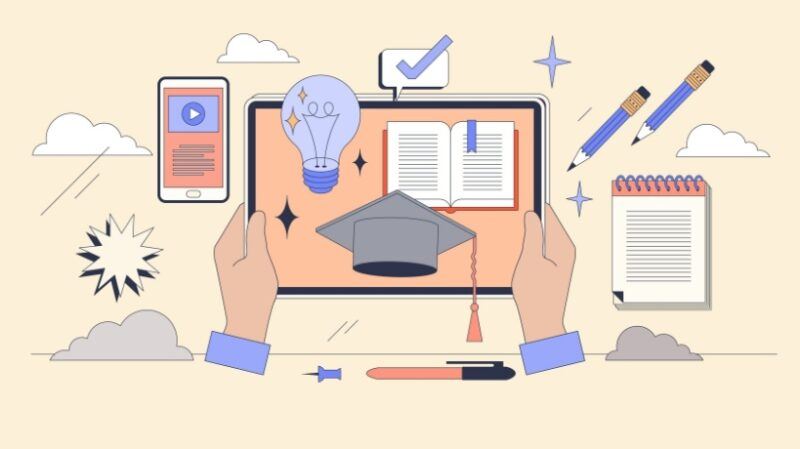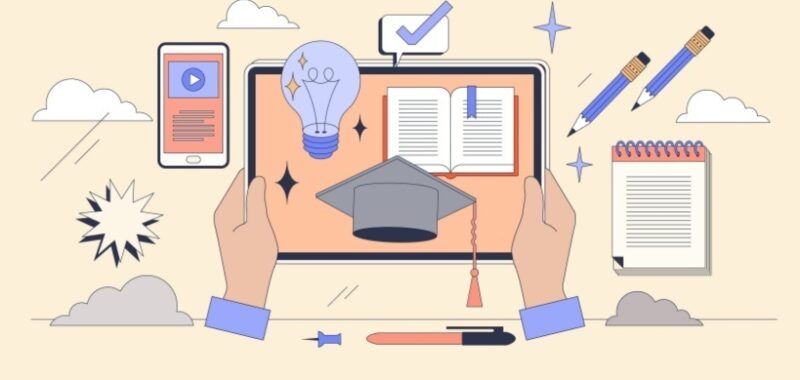
Transforming Education Digitally
Education is fundamental to human development, broadly opening doors to opportunities. Over the past decade, eLearning has become a massive hit, attracting numerous users and platforms. It has introduced a new dimension, prompting teachers to shift their focus toward innovative classes, competitive quizzes, and more.
The traditional educational system has struggled to keep pace with the fast-moving, innovative world, creating a need for upskilling and intensive advanced courses. To address this issue, mobile app development companies have stepped up to bridge the gap by enhancing eLearning platforms and offering a range of facilities. With this technological advancement in education, physical classrooms have been replaced by online platforms, ensuring smooth learning. This article will explore why eLearning apps are essential for modern education.
What Does eLearning Provide?
Let’s begin by asking what eLearning is. According to experts, “it is an educational technology that delivers training and education via networked interactivity and a range of other knowledge collection and distribution technologies” (Fry, 2000). eLearning provides an exciting curriculum, intriguing modules, and tasks to engage students and learners. It provides flexible learning schedules. The advent of eLearning has eradicated the geographical barriers to the world of knowledge.
What Makes eLearning Applications Stand Out?
Affordable And Accessible
eLearning has opened opportunities for affordable and accessible education. Students have access to recorded classes, so they don’t miss out on opportunities. The availability of customized syllabi for their specific needs and mock tests has revolutionized education. Students and learners will probably not have this ability to interact with the teacher at anytime and anywhere in the traditional method of education.
Global Reach Under One Umbrella
eLearning applications are not limited to any particular country or state. They have expanded their reach globally. This approach allows people from around the world to come together and explore modern education. It fosters cultural exchange, diversity, a chance to learn foreign languages, and the ability to always be with the trend as far as technological advancements are concerned.
Interactive Learning To Foster Efficiency
With the advent of Augmented Reality (AR) and Virtual Reality (VR), education has become more engaging. Students are keen to participate in classes. AR can be used in some subjects to allow students to explore details in a 3D format. With this latest technology, students can gain knowledge and be eager to learn more. Conversely, it was pretty challenging to get such exposure in subjects like biology and physics in the traditional classroom, and due to this lack, students didn’t look forward to a career in this stream.
Immediate Feedback
Nowadays, eLearning platforms provide all facilities from online classes and quizzes to preparing for final examinations. The main agenda is to keep students ahead of the curve and shape their knowledge meticulously. Students are given opportunities to fix mistakes and get feedback from certified teachers anytime. This boosts the students’ confidence and fosters quality results. Educational institutions know how to serve their students, and to achieve this, they collaborate with app development companies to make their modules intriguing, easy, and results-oriented.
Customized Learning
eLearning applications have opened numerous paths of education. Users can specifically focus on their interests. With the passage of time, online learning has become the gateway to saving the money that used to be spent on traveling, living, and pen-and-paper costs. This facility allows users to learn what society needs in a comprehensive way. Software development companies help design eLearning platforms to prevent any technical inefficiency.
Real-Life eLearning Applications Development With Artificial Intelligence, And Augmented And Virtual Reality
Artificial Intelligence (AI) can have a profound impact in expanding the implications of eLearning, by continuously broadening the scope for exploration. Some platforms use Artificial Intelligence to adjust math lessons based on real-time student performance, providing sums that are neither too easy nor complex challenges. Next, AR/VR have practical implications of education. For example, Augmented Reality is used in advanced education.
The Role Of An App Development Company In Modern Education
App development services explicitly collaborate with custom eLearning, which plays a vital role in modern education, offering a customized range of features to educate the students. An LMS is the best example here. This comprehensive platform can be used to manage, track, and deliver the learning as required.
Conclusion
Integrating technology into education revolutionizes the educational realm and fosters keen interest among students. It removes boredom from the classrooms, takes them one step closer to real life, and makes them aware of the implications of our knowledge. eLearning is the best source of wisdom for reshaping a better and more demanding education for the future. These technologies allow learning anytime, anywhere. As teaching methods have improved, what we should teach is becoming the primary concern among educational institutions. Interest in logical thinking, reasoning, and practical subjects is prominent.
Frequently Asked Questions About eLearning Applications
Why are eLearning apps considered essential for modern education?
eLearning applications are essential for staying ahead of the curve in the modern world. They provide flexibility, affordability, and accessibility. They eliminate geographical barriers and allow students worldwide access to quality education. Customized syllabuses foster creativity and self-learning, reducing the need for micro-management. Technologies like AR/VR and the metaverse create an engaging method of learning so students can get interested.
How do eLearning apps enhance student engagement and learning efficiency?
eLearning enhances student engagement by integrating AR/VR and AI into the curriculum. This approach builds interactive and playful classes, offering students a real-world tour beyond rote memorization. Students can understand and experience the concepts and implications through real-life scenarios. 3D models can help awaken students’ interest in the subject.
How much time does it take to build an eLearning platform?
The time it takes to build an eLearning platform depends entirely on the scope of the project, the off-the-shelf solutions available, and the complexity of the applications. Generally, it might take between six months to a year. To understand the exact development time, it is necessary to detail the product requirements and the features list.
How much does it cost to build an eLearning application?
The costs vary depending on the complexity and type of application. Other deciding factors like User Interface/User Experience and the tech stack also impact the price. So, it is preferable to contact the application development company to get a product estimate.

